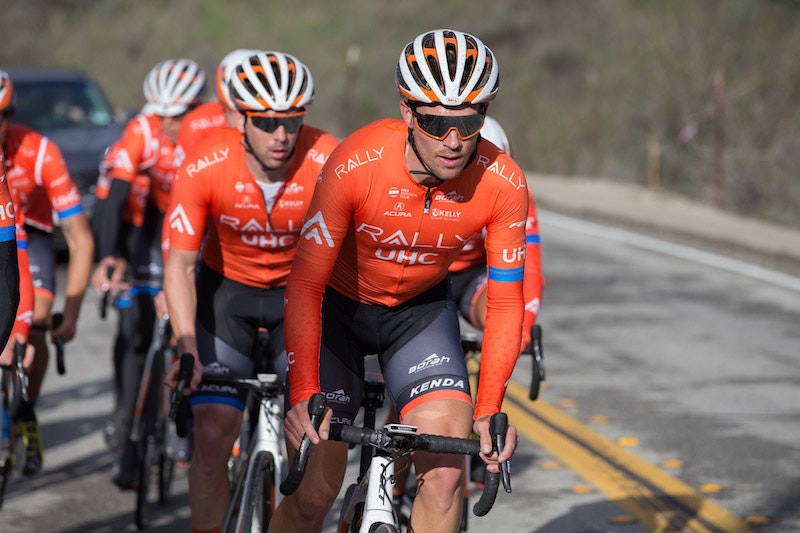After an eight-hour workday or a morning full of chores, lacing up for a run or a fitness class may feel like the very last thing you want to do. Believe it or not, professional athletes can relate. Some days, even the riders on the Rally UHC Cycling team don’t feel like getting out and hitting their rides hard. Motivating yourself to gear up for a workout when you’re just not feeling it “can feel like trying to light a fire without any matches,” says sports psychologist Simon Marshall, PhD, co-author of the book The Brave Athlete. But learning how to push yourself becomes easier and easier with time. “It’s like a snowball effect,” Marshall says. “Once you get going, that snowball starts building and rolling and becomes bigger and stronger.”
Below, Marshall and Rally UHC’s cyclists offer their best advice for getting out the door and into your workout with a positive attitude. The most important takeaway? Once you start moving, putting in the effort rarely feels as hard as you thought it would.
Remember your why
Racer Ryan Anderson has trained through wicked weather — from blizzards in Canada to scorching summer temperatures in Europe — so he knows the feeling of not wanting to work out. When he has to summon enthusiasm to get going, he thinks about his teammates. “I want to be better for them,” he says, “as well as for myself.”
Marshall says Anderson’s tactic is smart. “Any opportunity to make your workout about something other than you is going to really help,” he says. “If you can make your why about other people — like staying accountable to your running group or soccer team — your brain is going to be attracted to that.” Maybe you want to be healthier so you can chase your kids at the park; your why. The next time a workout starts to feel like a slog, keep that in mind.
Channel your inner toughie
“I honestly don’t know how I go hard. I just know that in this sport, you need to suffer, and you get used to it,” says Colin Joyce, who placed third in the Arctic Race of Norway in 2018. “A race is never going to be easy, so you might as well embrace it when you're not motivated for it and try your hardest anyway.” The days when you get out and complete your run or boot camp class even when you’re not feeling particularly sporty are the ones that ultimately make you tougher.
“When we force ourselves to experience discomfort, our brain adapts,” Marshall says, “so it becomes easier next time.” The next time you’re mulling skipping spin class to binge on Netflix, drag yourself to the gym instead. Completing your workout will feel great — and make you grittier in the long run.
Find music that pumps you up
“Music is a huge ergogenic aid,” Marshall says. “When you listen to music you like, your perceived exertion drops and you become more physically resilient.” Abby Mickey, who’s been racing professionally for five years, knows this well. “Honestly, music turns my head off,” she says. “There’s no better way to up the mood. Just putting on headphones puts me in a new headspace. ‘Shake It Off,’ by Taylor Swift, is my go-to.” Criterium expert Sara Bergen ups the ante by creating whole playlists with specific races in mind. “I have ones called ‘Crush it at Joe Martin Stage Race’ or ‘Go fast in Belgian Time Trial,” she says. Try it: Make a playlist of your own, timing the most inspiring songs to the hardest parts of your workout — say, when you’re powering through an incline on the treadmill or cranking up the resistance on the elliptical machine.
Build easy days into your weekly routine
Sometimes taking a slower spin is the best thing for your body, says Erica Allar, one of the veteran members of the Rally UHC Cycling women’s team. If you’re feeling particularly tired on a day when you’ve lined up a punishing ride or a grueling CrossFit class, consider swapping out your plan for a lower-intensity workout like power walking or restorative yoga. “Take steps to make sure you’ve recovered for hard sessions — for example, by sleeping a few extra hours the night before,” says Marshall. If you find yourself having to dial down your effort or skip workouts a lot, Marshall recommends adjusting your training schedule. Mixing up your routine with a new type of workout can help overextended muscles recover (hello, cyclists’ quads and calves!) and renew your motivation. Seek out fun activities, Marshall says, “that make you feel excited.”
Stay positive
It’s easy to get stuck in a negative thought spiral when a workout isn’t going well. Snap out of it by reminding yourself that not every sweat session will be a personal best — and that’s OK. “I think staying present and knowing that a ride or workout might stink, but still going out and trying hard, is important,” says Allar.
Marshall agrees. “Give yourself permission to not be fast or efficient every single time,” he says. “Take every training session as an opportunity to learn more about yourself.” Don’t put pressure on yourself to be perfect. Going out and trying your best is what matters most.
MOLLY HURFORD
Rally Health





